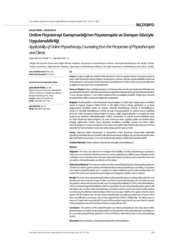Online Fizyoterapi Danışmanlığı’nın Fizyoterapist ve Danışan Gözüyle Uygulanabilirliği
-
Tür
Makale
- Yayın Tarihi 2022
-
Yayıncı
İzmir Kâtip Çelebi Üniversitesi Sağlık Bilimleri Fakültesi
- Dergi Adı İzmir Kâtip Çelebi Üniversitesi Sağlık Bilimleri Fakültesi Dergisi 7, ( 2 ), pp.277 - 288
- Tek Biçim Adres https://hdl.handle.net/11469/2082
-
Konu Başlıkları
Telekonsültasyon
Fizyoterapi
Telesağlık
Telerehabilitasyon
Teleconsultation
Physiotherapy
Telehealth
Telerehabilitation
Amaç: Bu çalışma; sağlık hizmetlerinin farklı alanlarında e-hizmet uygulamalarının artmasıyla gündeme gelen online fizyoterapi danışmanlığının; fizyoterapist ve danışan gözüyle uygulanabilirliğini araştırmak ve fizyoterapist ve danışanların ileriki dönemlerde gerçekleşmesi muhtemel olan bu konuyla ilgili görüş ve algılarını ortaya çıkarmak amacıyla planlandı. Gereç ve Yöntem: Çalışma 266 fizyoterapist ve 234 danışan birey olmak üzere toplamda 500 katılımcı ile gerçekleştirildi. Bireylerin online fizyoterapi danışmanlığı hakkındaki görüşlerini almak için fizyoterapistlere 13 soru, danışan bireylere 11 soru online sorgulama formu aracılığıyla yöneltildi. Araştırmanın sonuçları yüzdelerle ifade edildi ve kategorik değişkenler karşılaştırıldı. Bulgular: Fizyoterapistlerin online fizyoterapi danışmanlığının en fazla fayda sağlayacağına inandıkları alanlar; Ev Egzersiz Programı Takibi (%92,6) ve Aile Eğitimi (%81,2) olduğu görülürken en az fayda sağlayacağına inandıkları alanlar ise sırasıyla; Onkolojik Rehabilitasyon (%27,8), El Rehabilitasyonu (%28,2) ve Nörolojik Rehabilitasyon (%28,6) olmuştur. Fizyoterapistlerin en yüksek oranda katıldıkları görüş ise; online fizyoterapi danışmanlığının koruyucu sağlık uygulamalarında ev programının etkin uygulanması takibinde kullanılabileceğidir (%88,0). Danışanların en yüksek oranda katıldıkları görüş ise online fizyoterapi danışmanlığının yüz yüze randevuya erişim güçlüğü çekilen zamanlarda erişim kolaylığı sağlamasıdır (%94,0). Ayrıca danışanlar kendilerine yöneltilen soruların her birine %80’in üzerinde katılıyorum cevabı vermişlerdir ve bu cevabı veren katılımcıların büyük çoğunluğunun (%62’nin üzerinde) “iyi” internet kullanım becerisine sahip olduğu görülmüştür (p<0,05). Sonuç: Çalışmaya katılan fizyoterapist ve danışanların online fizyoterapi danışmanlığı hakkındaki görüşleri genel olarak olumlu yöndedir. Online fizyoterapi danışmanlığının yüz yüze fizyoterapi hizmetine alternatif olabilmesi açısından umut verici bir fizyoterapi yaklaşımı olabileceği düşünülmektedir
Objective: This study was planned to investigate the feasibility of online physiotherapy consultancy, which has come to the fore with the increase in e-service applications in different areas of health services and likely to ocur in the future, from the eyes of physiotherapists and clients, and to reveal the views and perceptions of physiotherapists and clients on this subject. Material and Method: The study was carried out with a total of 500 participants, 266 physiotherapists and 234 clients. In order to get the opinions of individuals about online physiotherapy counseling, 13 questions were asked to physiotherapists and 11 questions to clients individuals via the online questionnaire. The results of the study were expressed as percentages and categorical variables were compared. Results: The areas where physiotherapists believe online physiotherapy counseling will provide the most benefit were; Home Exercise Program Follow-up (92.6%) and Family Education (81.2%) while the areas they believe will provide the least benefit were Oncological Rehabilitation (27.8%), Hand Rehabilitation, (28.2%) and Neurological Rehabilitation (28.6%), respectively. The view that physiotherapists agreed with the highest rate was that online physiotherapy counseling could be used in preventive health practices in monitoring the effective implementation of the home program (88.0%). The opinion that the clients agreed with the highest rate was that online physiotherapy counseling provided ease of access when there was difficulty in accessing a face-to-face appointment (94.0%). Additionally, the clients gave an answer of “I agree with more than 80%” to each of the questions asked, and it was seen that the majority of the participants (over 62%) had “good” internet usage skills (p<0.05). Conclusion: The opinions of the physiotherapists and clients participating in the study about online physiotherapy counseling are generally positive. It is thought that online physiotherapy counseling can be a promising physiotherapy approach in terms of being an alternative to face-to-face physiotherapy service.
-
Koleksiyonlar
FAKÜLTELER
SAĞLIK BİLİMLERİ FAKÜLTESİ

 Tam Metin
Tam Metin

